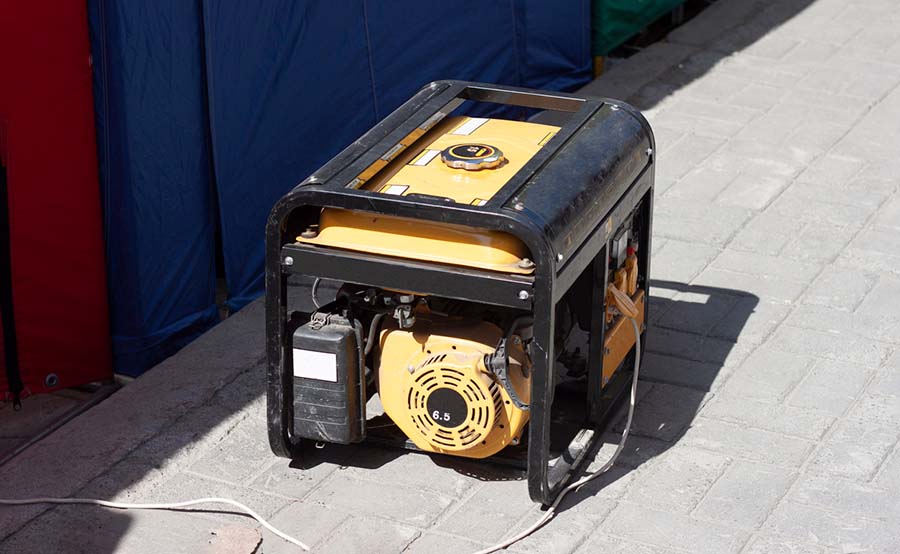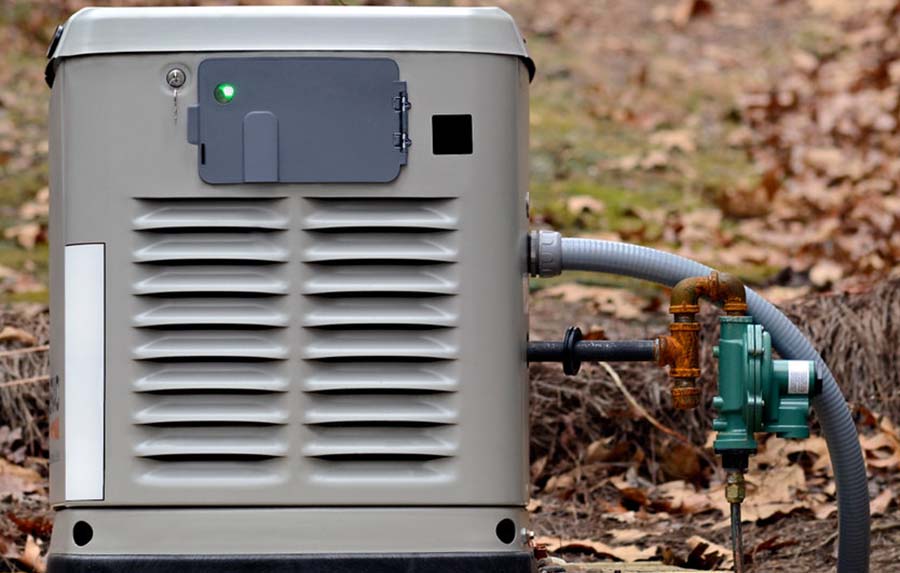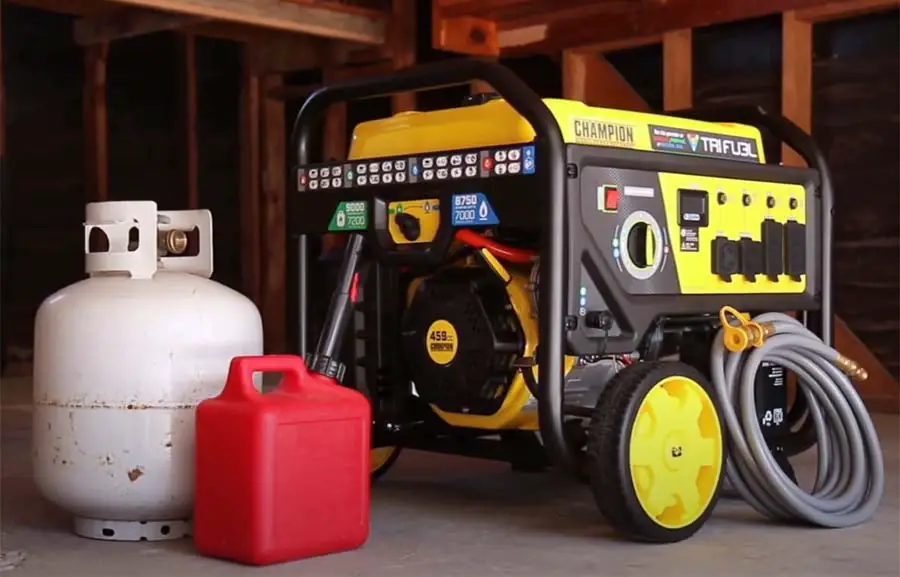
Generators provide us with an alternative source of energy. The problem is, generators have limits, and they require specific conditions to operate. These conditions include having the right chemical to convert into energy. Sometimes, we want to use a different chemical. So, ever wondered if using natural gas to run your generator is possible?
It is possible to convert a diesel generator to run on natural gas, but you must install an adapter between the gas supply and the carburetor. The adapter combines the natural gas vapors into the air stream above the carburetor. In most cases, you do not need to modify the generator’s carburetor.
As easy as it seems when reading about it, converting your generator can be tricky. However, in today’s article, we are going to go in-depth on the topic. So, Let’s find out how you can convert your diesel generator to run on natural gas.
How to Convert Your Diesel Generator to Run on Natural Gas
You can convert diesel generators to run on natural gas. However, the engine’s power level after the conversion depends on numerous issues, like the quality of the natural gas, the power level of the original diesel engine, and the emission levels required. Fuel adapter kits are not a permanent conversion but an adaptation. Fuel adapter kits are the easiest conversion method from diesel to natural gas and the least expensive and not labor-intensive.
When you convert diesel engines to natural gas, they generally require added components and mechanical changes. The diesel generator will get a converter kit installed that transforms it from a diesel engine to a natural gas engine.
You can convert your diesel generator to run on natural gas, gasoline, and propane at any time, but you will need a Tri-Fuel Conversion Kit from US Carburetion. This tri-fuel conversion kit will cost you about 200 dollars. This is worth it in the long run as diesel-to-natural gas engine conversions make economic sense.
You will need some basic tools for the fuel conversion like screwdrivers, socket set, wrenches, and some Teflon seal tape.
You can buy this tape from almost any hardware store. The conversion can take a few hours; it all depends on how mechanically skilled you are. If you are not proficient in that sense or don’t have enough engine experience, it is safer to get some experienced professional to do the installation for you.
Why Would You Want to Run a Generator On Natural Gas?

A couple of years ago, the traditional logic for generator sets was that diesel was reliable and inexpensive but messy and loud. Using natural gas meant it was expensive and temperamental but also cleaner and quieter. Due to the development of new engine technologies, the differences between diesel and natural gas generators are no longer clearly defined.
Traditionally, diesel engines provide power, response, and longevity, while natural gas engines are more environmentally friendly. Even though the environmental argument for natural gas is valid, diesel is no longer the winner in terms of response and power. The most significant advantage of natural gas is that natural gas burns more cleanly than diesel.
Spark-ignited natural gas engine manufacturers now optimize the RPM of these engines to make the transient response like that of diesel engines. Natural gas generator manufacturers also produce natural gas generators that meet the 10-second startup requirement for backup generators traditionally associated with only diesel engines.
There is a common misconception that diesel engines are less expensive than natural gas engines. Below 150kW, natural gas engines are far more cost-effective, even without factoring in the fuel differential.
The Benefits of a Natural Gas Generator
Using natural gas to run your generator has several advantages:
- Shelf life. Gasoline can eventually go bad when stored long without additives added, while natural gas and propane won’t. Natural gas and propane are more stable to use.
- Storage. It is easy to store large amounts of natural gas and propane. Natural gas comes compressed in tanks which are preferred for storing several gallons of gasoline. Large quantities of natural gas and propane are easier to transport than gasoline or diesel.
- Availability. Usually, there is a higher demand for gasoline than natural gas and propane in emergencies. Gasoline can only be bought at gas stations, while natural gas and propane are available not only in gas stations but can be bought from camping and department stores.
- Less noise. An engine running on natural gas or propane or is far quieter than gasoline or diesel engines.
- Clean burning. Natural gas and propane burn cleaner than diesel or gasoline. Natural gas generators emit less harmful fumes than diesel or gasoline engines. Natural gas does not have a strong odor, like diesel generators. Comparing natural gas to diesel, the amounts of sulfur, nitrogen, and carbon dioxide, which is a greenhouse gas, are considerably lower. This makes natural gas the cleanest fuel to burn.
- Durability. Generators that run on natural gas or propane have a longer lifespan than diesel generators.
- Unlimited Source. Having a source of natural gas available gives you an unlimited power supply.
The Disadvantages of a Natural Gas Generator
You can consider one of the advantages of natural gas also to be a disadvantage. Natural gas does not need to be stored, as it is generally supplied through pipelines. However, during a natural disaster or emergency, the flow of natural gas could be interrupted where you might find yourself with a lack of fuel when you need it most.
Fueling your equipment during an outage when the regular power supply is down can be a significant concern. Natural gas is highly explosive and could be a fire hazard if something happens to the gas pipeline.
Common Places Where Natural Gas Generators are Used
Hospitals and nursing homes are facilities where the supply of continuous power is critical. They use natural gas generators instead of generators powered by gasoline or diesel. Gasoline has a limited shelf life if no preservatives are added and could be challenging to find during electrical outages.
Propane tanks might also be scarce during natural disasters. Diesel generators are notorious air pollution contributors. Most companies these days are looking to be more sustainable, and natural gas generators give them that option.
For this reason, installers of residential standby generators choose natural gas as the primary source of fuel. Using natural gas will not leave the homeowner stuck with regularly having to cycle through fresh gasoline. You would not have to add any fuel, and the gas is automatically supplied through the utility line.
What are Tri-Fuel Generators?
Although many generators run on natural gas, some use two or three fuel sources like gasoline, natural gas, propane, or diesel. These generators are called dual-fuel or tri-fuel generators. With portable generators, it is hard to find a natural gas-only model. Finding a natural gas hookup is not always easy when you are on the go; people commonly use dual-fuel and tri-fuel portable generators in these situations.
When you have a Tr-fuel generator, it gives you the advantage of increased freedom and flexibility. Gasoline is easily available from gas stations, but the cost is highly variable. Gasoline might not always be readily available in a natural disaster such as a hurricane.
Natural gas is very efficient, clean, and works wonderfully as a generator fuel. You can easily find a propane tank in most stores, but propane is generally more expensive than natural gas.
There are pros and cons to all these fuel sources. A tri-fuel generator will give you the freedom to decide which fuel source is best to use at a particular moment in time. A tri-fuel generator can save you if you run out of a specific fuel. For example, if you run out of gasoline but have a propane tank in the garage, you won’t be pressed to go out and buy more gasoline during an emergency or power outage. You can just switch the dial to the preferred fuel.
Ready-Made Natural Gas and Diesel Generators from Champion

If you don’t want to go through all that trouble to convert your old diesel generator to natural gas and have the means, you can always buy one of the new tri-fuel generators available on the market. The New Tri-Fuel Natural Gas Ready Portable Generator from Champion Power Equipment is designed to run on a choice of three fuels. Champion’s natural gas-ready generator is a reliable power source with the ultimate flexibility in the fuel source.
If you are not running your generator on natural gas, you can also operate your generator on propane or gasoline. The option to operate this generator on three fuel types makes it one of the most versatile generators on the market today.
It does not matter which fuel you choose; you are all set to go right from the start. This is because Champion natural gas generators come ready with natural gas and propane hoses and a battery for the convenient electric start and engine oil.
You might think operating a generator like this will be complicated, specifically if you want to switch fuels, but it is easy. The EZ Start dial on the Champion generator allows you to safely select gasoline, propane, or natural gas as your fuel source. An added plus is propane, and a natural gas selector is located on the side panel.
The Champion Tri-Fuel Generator also comes with CO Shield® technology. Champion’s CO Shield offers powerful protection from hazardous carbon monoxide if the generator is not used in an appropriate area. Always operate generators outside in open-air environments far away from doors, windows, and vents in all circumstances.
This generator includes a 25-foot natural gas hose kit, which has a female easy connect end and a female flare fitting end with an NPT male adapter so you can connect your generator easily to your home’s natural gas pipeline.
If propane is a more convenient fuel source for you, just use the supplied 6-foot propane hose with a built-in regulator to connect your generator to a propane tank. The generator can run for 5 hours at 50% load when you use a 20-pound propane tank.
When running your generator on gasoline, at times, an 8.5-gallon fuel tank will run your generator for 12.5 hours at 50% load when it is filled up.
The Champion natural gas ready generator with Tri-fuel technology is one more way. Champion Power Equipment’s innovative features ensure you have access to flexible, reliable power whenever you need it. So, if converting a diesel generator to natural gas sounds like too much work, you can always buy the ready-made Champion Tri-fuel generator.
Conclusion
Converting your diesel generator to run on natural gas will allow you to reduce fuel costs substantially. A converted diesel generator will extend emergency run-time and improve sustainability by substituting diesel fuel with efficient, cleaner-burning natural gas.
Natural gas generators are widely used today and are an efficient means of generating power. You can use natural gas generators to power both portable and standby generators. Natural gas is regarded as one of the most effective and affordable and fuels among non-renewable resources for power generation. Converting your old diesel generator to run on natural gas makes sense in all these ways.
You shouldn’t experience any loss of output with converted diesel generators; they have shown performance in vital areas like power output, load acceptance, efficiency, and stability. Purchase your conversion kit today and get that old diesel generator running on natural gas.

